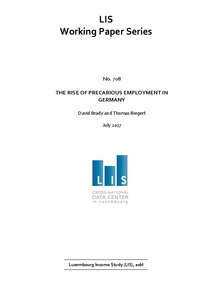The rise of precarious employment in Germany

Brady, David ; Biegert, Thomas
LIS - Luxembourg
2017
39 p.
employment security ; labour market segmentation ; precarious employment
Working Paper
708
Employment
English
Bibliogr.
"Long considered the classic coordinated market economy featuring employment security and relatively little employment precarity, the German labor market has undergone profound changes in recent decades. We assess the evidence for a rise in precarious employment in Germany from 1984 to 2013. Using data from the German Socio-Economic Panel (SOEP) through the Luxembourg Income Study, we examine low-wage employment, working poverty, and temporary employment. We also analyze changes in the demographics and the education/skill level of the German labor force. Although employment overall has increased, there has been a simultaneous significant increase in earnings and wage inequality. Moreover, there has been a clear increase in all three measures of precarious employment. The analyses reveal that models including a wide variety of independent variables – demographic, education/skill, job/work characteristics, and region – cannot explain the rise of precarious employment. Instead, we propose institutional change is the most plausible explanation. In addition to reunification and major social policy and labor market reforms, we highlight the dramatic decline of unionization among German workers. We conclude that while there are elements of stability to the German coordinated market economy, Germany increasingly exhibits substantial dualization, liberalization, inequality, and precarity."
Digital
The ETUI is co-funded by the European Union. Views and opinions expressed are however those of the author(s) only and do not necessarily reflect those of the European Union or the ETUI.